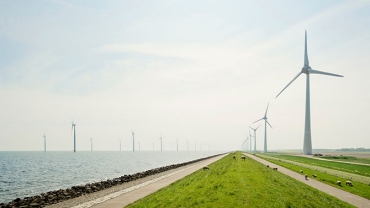
Prepare for a new trade relationship with the United Kingdom
01/30/20
Important issues in the transition period
Brexit is now a fact as of 31 January 2020. During the transition period, which runs until the end of 2020, the European Union (EU) and the United Kingdom (UK) are negotiating the new trade relationship. After the transition period the UK will become a third country, meaning that customs formalities, procedures and possibly tariffs will be applicable. Rules around the free movement of people will also change. How should companies prepare during the transition period?

Stop-gap measures after 2020
During the 11-month transition period from 1 February 2020, the UK will be treated as an EU member state. EU Directives remain valid during that period. After the transition period there will be changes in all kinds of areas. What exactly they look like depends in part on the trade agreement that will be concluded.
Nonetheless, negotiations on future relations between the EU and the UK concern not only trade but also issues such as the fight against terrorism, defence and travel connections. Discussions on future relations are expected to continue beyond 2020, and stop-gap measures will be needed in some areas. The EU's chief negotiator - Michel Barnier - has provided examples of air and road transport where the EU can grant temporary permissions to the UK to continue business as usual.
Changes after the transition period
What is certain is that, there will be changes in the application of EU Directives on corporate tax. Dutch implementing legislation refers to EU Member States - that will no longer be the UK. As far as customs are concerned, goods that cross the border between the EU and the United Kingdom will become imports and exports instead of intra-Community transactions. The UK also becomes a third country for the application of EU VAT Directives and Regulations,meaning that EU VAT Regulations will no longer apply in the UK. New rules will also apply to UK nationals living and working in an EU Member State, as well as to EU citizensin the UK. What can companies do during the transition period to prepare for these changes? Below you will find a number of points for attention.
Direct taxes
As noted above, the Directives, such as, for example, the Parent-Subsidiary Directive and the Interest and Royalties Directive, will continue to apply during the transitional period. This will allow companies to re-examine their legal structure in order to avoid the breaking up of a fiscal unity or exposure to, for example, withholding taxes after the transition period. But consider also, for example, the reporting obligation for certain DAC6 transactions. After 2020, the UK will no longer fall within the scope of this Directive and it would be wise to take this into account now when setting up the DAC6 processes within your company.
Customs and supply chain
It is important to pay attention also to transactions with third countries with which the EU has Free Trade Agreements, also during the transition period. If partner countries do not agree with the position of the UK during the transition period, companies must have new calculations for the Rules of Origin ready by 1 February 2020.
VAT and EORI registrations
Companies can apply for VAT and EORI registrations, as well as tax representation of UK entities in EU Member States. You can also use 2020 to analyse your transaction chains in preparation for Brexit. Several EU Member States do use 31 January 2020 as the date of withdrawal for validating EORI numbers to enable businesses to potentially already make certain changes now.
Quick Fixes changes
Have a look at the Quick Fixes that apply in most EU Member States as of 1 January 2020 (in some EU Member States a few months later). The Quick Fixes will tell you about the mandatory use of aVAT identification number when applying the VAT zero rate, the prevention of a VAT registration for call-off stock, the assignment of transport when goods are sold in chain transactions within the EU and the evidence to be used for application of the zero VAT rate for EU B2B goods supplies.
As the VAT identification number becomes a material requirement for the application of the zero VAT rate, the verification of this number and storing this verification, in principle per transaction, and the quality of customer master data also becomes crucial. PwC has designed a system-agnostic solution to check these VAT identification numbers for validity in an easily accessible manner and to post the result back into your system. We are happy to discuss the Quick Fixes and their implementation in your supply chains and systems.
Employees
Free movement rules will continue to apply to employees and their family members until the end of the transition period. However, after the end of the transition period, national immigration rules will apply in each member state and new bilateral treaties will need to be agreed on social security. Employers should therefore ensure they map their employee groups - such as expats, commuters and business travellers - and what the impact of Brexit will be for each group. Taking action now will ensure that employers will be compliant with the new rules from day one and that additional processing times will not adversely affect business operations.
Contracts
In new contracts, it is important to take into account the possible consequences of Brexit, for example by clauses on timely delivery and increasing transport times, additional costs for customs formalities, transport conditions, etc.
Financial reporting
On the basis of transitional arrangements in the UK-EU Exit Agreement, certain accounting rules, under which article 2: 403 BW (group exemption for the financial statements of Dutch subsidiaries), will remain applicable until the end of 2020. This means that for financial statements 2019, Dutch entities could apply a group exemption under article 403, under the condition that the group financial statements of the UK parent has been prepared no later than 31 December 2020. Of course other mandatory conditions must be met as well. Other facilities which are included in the EU Directives on accounting also remain applicable until the end of this year. After this date, however, the exemption will no longer apply and Dutch subsidiaries of UK companies need to prepare financial statements which also may have to be audited.
No time to lose
Although many changes come into effect after 2020, the overview above makes it clear that there is no time to waste in preparing your company for the end of the transition period. Not sure what to do or where to start? Our team of Brexit experts is ready to advise you and your company.
Contact us

















